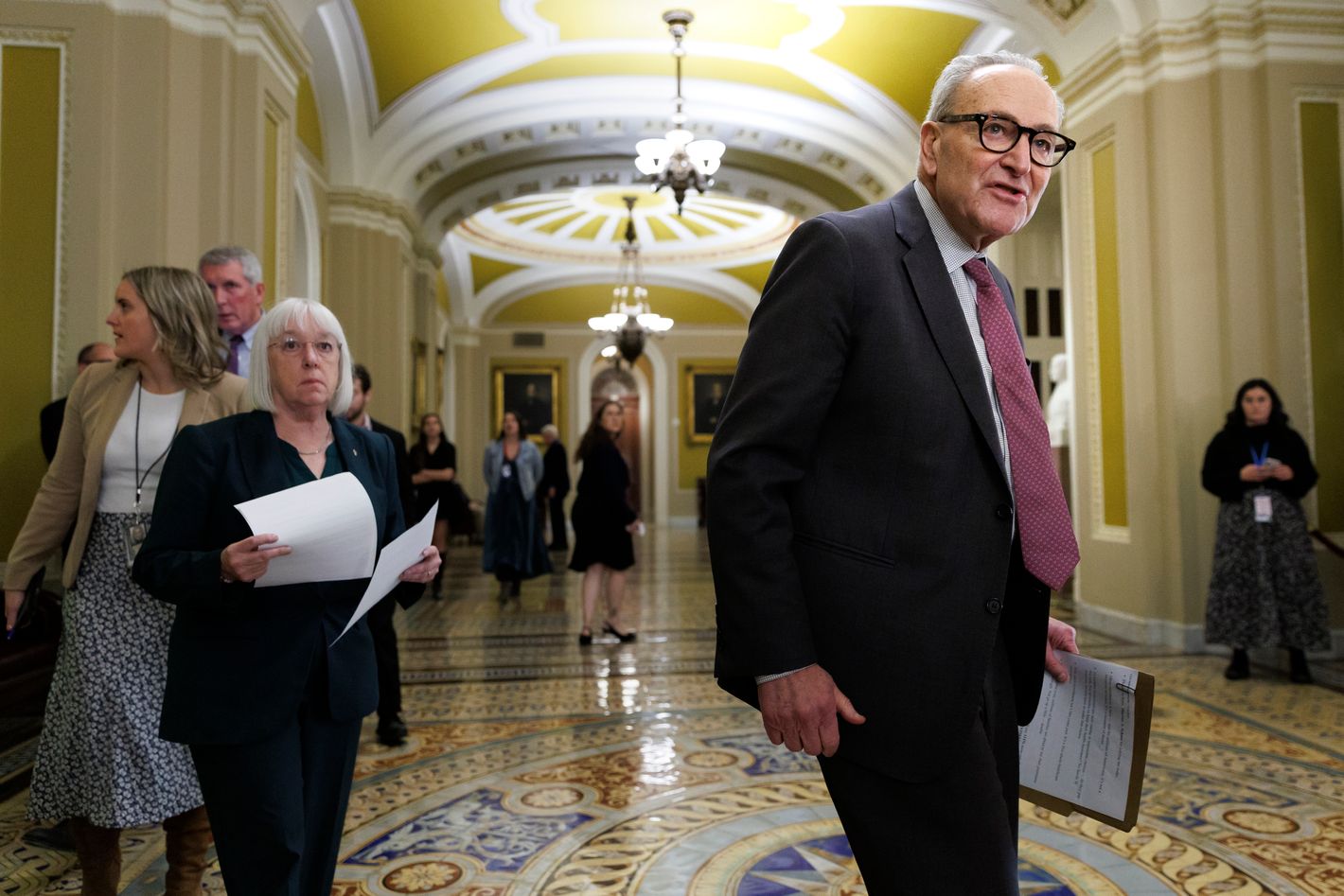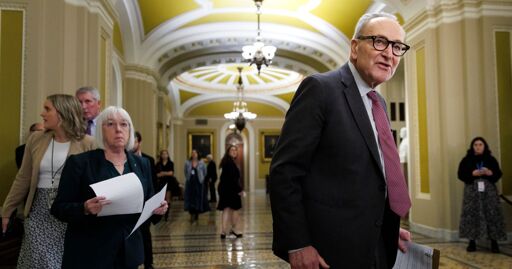
Photo: Tom Brenner/Getty Images
Before Sunday night’s Senate vote cleared the way for legislation that would end the longest government shutdown in history, you got the sense the it would either be resolved quickly or extend into the holiday season. Why? Because the central announced goal for Democrats, the extension of Obamacare-premium subsidies, wasn’t happening and likely would never happen until such time as Donald Trump stepped in and forced a deal on MAGA Republicans.
With Trump showing zero signs of engagement, other than a petulant demand that the whole problem go away via the abolition of the filibuster, the choice for Democrats was binary. They could keep up the pressure until he came off the sidelines or end the shutdown to mitigate the pain being experienced by Democratic constituencies while preserving the Obamacare-premium issue for the midterms. Eight Democrats — with probably a lot more of them privately agreeing — chose the second path, and that’s all it took to end the filibuster. It was a fairly simple pain-for-gain cost-benefit calculation for the five (Dick Durbin, Tim Kaine, Maggie Kassan, Jacky Rosen, and Jeanne Shaheen) who had voted 15 times against Republican measures to end the shutdown but then moved across the line to break the deadlock along with original dissenters Catherine Cortez Masto, John Fetterman, and Angus King.
While there’s already wild talk in progressive circles of “primarying” the “traitors” who caved and spoiled the good vibes emanating from the Democratic electoral sweep of last week, this was a fairly predictable development. Again, absent a Trump intervention that looked increasingly unlikely, Democrats weren’t going to “win” on the Obamacare subsidies and some of them privately hoped they wouldn’t since a bipartisan solution might take the issue off the tables for the midterms. Meanwhile, for all the superficial unity on a health-care message for the shutdown, Democrats were really all over the place about the rationale for their actions, as Ezra Klein observes:
Democrats said the shutdown was about the subsidies, but for most of them, it wasn’t. It was about Trump’s authoritarianism. It was about showing their base — and themselves — that they could fight back. It was about treating an abnormal political moment abnormally.
In addition, as Nate Silver notes, it wasn’t the Obamacare-premium spikes that attracted the most public attention in the last week or so but the SNAP-benefit cutoffs that Trump stupidly embraced and that a reopening of government would instantly fix.
Ultimately, a majority of congressional Democrats believed the election wins and polls showing a plurality of Americans blaming Republicans and Trump for the disruptions to government services meant they were “winning the shutdown” and ought to keep it up. A minority thought that with the off-year elections over and the shutdown damage really beginning to intensify, it was time to cash in the chips and move on. In the arithmetic of Congress, a minority of the minority had all the leverage.
Inevitably, this situation reflects poorly on Senate Democratic leader Chuck Schumer, who either (a) couldn’t keep his caucus together on a fundamental issue at a critical moment or (b) was privately engineering the “cave,” just as he did more openly back in March, the last time Democrats were in this position. His leadership position is increasingly untenable, and it wouldn’t be surprising if he surrendered it either before or immediately after the 2026 midterms.
In the meantime, the Sunday breakthrough isn’t a done deal. There will be some House GOP hardliners who won’t like the minor concessions Republicans made, and they will also be noisily signaling their hostility to doing anything on the Obamacare-premium subsidies, which is bad messaging for Republicans. Keeping the yahoos in line will be Speaker Mike Johnson’s job, and it will be interesting to see if he needs Trump’s help to do so (and whether a grumpy Trump complies).
Assuming the government does reopen very soon, Democrats must choose whether to descend into another “struggle for the soul of the party” or develop a better strategy for the struggles with Trump that lie just ahead. As Josh Marshall, a bitter critic of Schumer and of the Democratic “cave” on reopening the government argues, the shutdown fight was not a wasted effort:
There was a legitimate party rebellion after the March debacle. Democratic voters demanded fight. When the time came Democrats fought. They held out for 40 days, the longest shutdown standoff in history. They put health care at the center of the national political conversation and inflicted a lot of damage on Trump. At 40 days they could no longer hold their caucus together….
The upshot of the shutdown is that Democrats now own the affordability [issue] and they’ve focused it on health care coverage which Republicans want to make more expensive or take away altogether. That vote keeps it there. So will the huge price hikes millions will be feeling by December. Also, if I’m understanding the deal right this continuing resolution goes through January. So there’s another bite of the apple in just a couple of months.
So for Democrats, this is at worst a lost battle — or a tactical setback, if you wish — in a longer war that is looking increasingly more promising for them. It’s not a great time for a party civil war.
From Intelligencer - Daily News, Politics, Business, and Tech via this RSS feed

